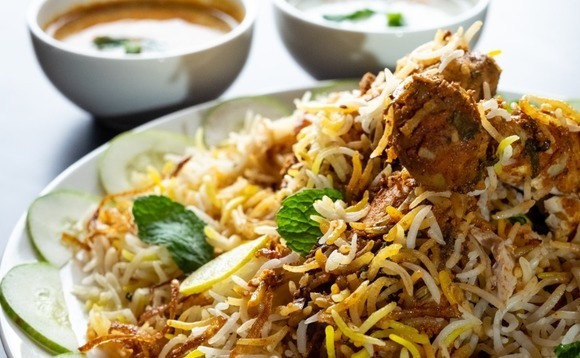
Deal focus: Serving biryani at scale

With biryani the dish of choice on India’s food delivery apps, Biryani By Kilo is looking to build out a standardized cloud kitchen model. It has $35 million in Series B funding to pursue this ambition
"We were intrigued by the fact that close to 40% of sales on Zomato were biryani," says Vikram Gupta, founder and managing partner of IvyCap Ventures, recalling his firm's evaluation of India cloud kitchen player Biryani By Kilo (BBK) in 2019. "As we went on, we found that 25% of India's food business is biryani, and it's popular globally where you have Muslim and South Asian populations."
Since IvyCap led an INR300 million ($4.3 million) Series A round, BBK has grown from 20 to 60 outlets. It has big ambitions – adding 150 kitchens over the next 18 months, exploring overseas expansion opportunities, and bolting on other dining brands – and Falcon Edge Capital is bankrolling them. The investor has led a $35 million Series B, with participation from SBI and IvyCap.
Biryani emerged as the best-selling dish on food delivery apps, ahead of pizza and other Western fast-food staples, in 2017. A year later, PwC and local industry association FICCI put out a report claiming that the organized biryani delivery market was worth around INR25 billion a year. BBK received funding alongside the likes of Paradise, Behrouz Biryani, Charcoal Biryani, and Biryani Blues.
India's food services market will be worth $110 billion by 2025, up from $65 billion in 2019, according to Redseer, a local consulting firm, spurred by an ongoing shift from unorganized to organized activity. Over the same period, penetration of online services will double, with food delivery gross merchandise value rising from $4.2 billion to $12.8 billion.
In July, Zomato became the first listed delivery platform; it now has a market capitalization of INR1.1 trillion. Three months later, Rebel Foods – which owns Behrouz Biryani, among other brands – became India's first cloud kitchen unicorn. Yet scale is not easily achieved in the biryani space.
"In pizza, you have two or three brands catering to 70% of the market, but that disruption is waiting to happen in biryani," says Gupta. "Standardization is more difficult. There are 4-5 cities in India that have their own popular biryani variants sold with the name of the city before the world biryani. For example, the spices, fragrances and presentation are very different in Hyderabad versus Lucknow."
He credits BBK with succeeding where others have failed because it addressed issues around standardization, quality, and delivery processes. The company sources centrally, enabling standardization in terms of ingredients and basic recipes. Cooking is the responsibility of individual kitchens. It has demonstrated agility at the micro-level, tweaking recipes to suit local tastes.
"Whenever they see a product move faster, they adapt to that," Gupta adds. "There is a lot of hit and miss – there are no precedents in the market, you don't know whether a particular taste will move."
At the same time, BBK refuses to compromise on quality. Dishes are cooked to order, with an adherence to the labor-intensive traditions of biryani and a minimum delivery time of 90 minutes. Gupta notes that customers expecting a 30-minute turnaround are told BBK isn't for them – and plenty are happy with the distinction, not wanting dishes to be classified as generic fast food.
The company has a presence in 20-30 cities, with dine-in restaurants in two or three locations, mainly for brand-building purposes. A similar approach might be taken in overseas markets, although founder Vishal Jindal stressed that buying other domestic brands that "can be scaled pan India with our expertise in supply chain, technology, and marketing" is just as important as going global.
"The market is large, but it is very unstructured. The way things are going, you will see more categories getting organized. We've seen samosa companies get funded and there's an opportunity in building out branded sweets, but no one has been able to do it on a large scale," Gupta adds.
"BBK has shown it can do 60 stores, it has the data points to scale up. Once the model is established, it can introduce more categories. The opportunity is larger than what is being targeted right now."
Latest News
Asian GPs slow implementation of ESG policies - survey
Asia-based private equity firms are assigning more dedicated resources to environment, social, and governance (ESG) programmes, but policy changes have slowed in the past 12 months, in part due to concerns raised internally and by LPs, according to a...
Singapore fintech start-up LXA gets $10m seed round
New Enterprise Associates (NEA) has led a USD 10m seed round for Singapore’s LXA, a financial technology start-up launched by a former Asia senior executive at The Blackstone Group.
India's InCred announces $60m round, claims unicorn status
Indian non-bank lender InCred Financial Services said it has received INR 5bn (USD 60m) at a valuation of at least USD 1bn from unnamed investors including “a global private equity fund.”
Insight leads $50m round for Australia's Roller
Insight Partners has led a USD 50m round for Australia’s Roller, a venue management software provider specializing in family fun parks.







